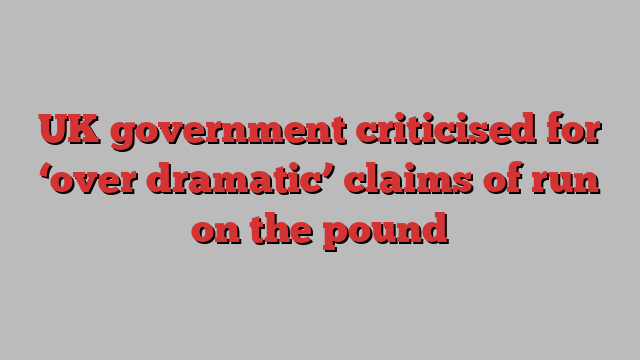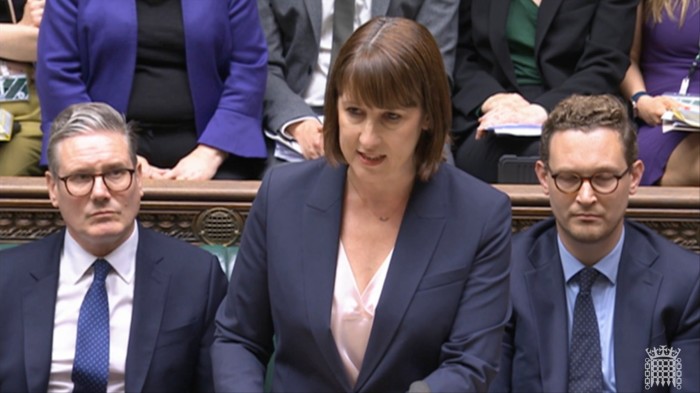
The UK’s new Labour government has been accused of exaggerating the financial market risks of a £22bn “black hole” in the public finances ahead of a Budget expected to contain large tax increases and spending cuts next month.
Lucy Powell, leader of the House of Commons, drew criticism after warning there could have been a “run on the pound” if the government had not made immediate spending cuts when it revealed the fiscal pressures last month.
“If there was a risk of a run on the pound I completely missed it,” said Paul Dales, UK economist at Capital Economics.
He said the UK was “light years” away from the market conditions that surrounded former Conservative Prime Minister Liz Truss’s “mini” Budget in 2022.
Investors do not currently appear to be “jittery” about Britain’s public finances, Dales added.
Craig Inches, head of rates and cash at Royal London Asset Management, added that Powell’s warning about a possible run on the pound was “slightly over dramatic”.
He noted that the UK currency is close to its strongest level on a trade-weighted basis since the Brexit referendum of 2016.
Labour, which took power in July for the first time since 2010, has ramped up its rhetoric on the fiscal inheritance it received from the Tories, as Prime Minister Sir Keir Starmer sets the stage for the new government’s first Budget on October 30.
Chancellor Rachel Reeves has accused her Tory predecessor Jeremy Hunt of hiding spending pressure from the public and the fiscal watchdog that amounted to a £22bn in-year overspend in the government’s finances.
The £22bn figure included £9.4bn from Reeves’s decision to accept independent recommendations for public sector pay rises and £6.4bn of unfunded costs of Britain’s asylum system.

Reeves announced a series of emergency spending cuts in July to close some of the claimed gap, including scrapping some infrastructure projects and restricting winter fuel benefits to only the poorest pensioners.
Powell told Sky News on Sunday that finding savings in the current year had been “very difficult indeed”.
She added: “And why we had to do that was because if we didn’t, we would have seen the markets losing confidence, potentially a run on the pound, the economy crashing.”
Reeves in an article for The Observer also said that, in her first month as chancellor, “it was made clear to me that unless I acted urgently, market confidence in the UK’s fiscal position could be seriously undermined”.
Investors said they had detected no unusual market tremors around the events of late July, adding that the UK was able to borrow at comfortable interest rates as news of the overspend emerged.
The pound was little changed as reports of the fiscal hole emerged ahead of Reeves’s formal announcement on July 29, sliding only slightly against the dollar and strengthening against the euro in the final days of July.
Ben Zaranko, of the Institute for Fiscal Policy, said suggestions of a threat of a run on the pound in July were “silly”.
He added: “There may be a political reason to try to keep Liz Truss in the imagination of the British people, but this is not a helpful contribution.”
Analysts said the £22bn fiscal gap announced by Reeves was relatively modest compared with the £278bn of gilts the government has said it plans to issue in the current financial year.
Markets have remained relatively unfazed, with benchmark UK borrowing costs falling 0.3 percentage points to 4 per cent since the government’s revised gilt remit was announced in April.
Peter Goves, head of developed market debt sovereign research at MFS Investment Management, said gilt supply “doesn’t appear to be causing much disturbance” in markets, with government borrowing costs primarily driven by the outlook for interest rates.
In September 2022’s “mini” Budget, an announcement of £45bn of unfunded tax cuts triggered a run on the pound, as hidden leverage in the UK’s pensions system unwound and investors were spooked by the government sidestepping the Office for Budget Responsibility.
Downing Street defended Powell’s comments on Monday, saying that the minister was making a broader point that the discovery of the alleged fiscal hole “clearly threatens economic and financial stability”.
A spokesman for Starmer insisted the prime minister and fellow ministers were not talking the economy down and argued that it was “the responsible thing to do to unearth that black hole”. He added: “Restoring economic stability is one of the key things business has asked for.”
However, Conservatives have ridiculed the idea that sterling, which recently hit a two-year high against the dollar, was on a precipice and that cutting £1.4bn from the winter fuel subsidy bill had helped to avert its collapse.
Kemi Badenoch, Tory leadership contender, said the Labour government was “clueless, irresponsible and dishonest”. She added: “They are trying to pull the wool over the eyes of the public about the state of Britain’s finances.”
Starmer rejected the claim. “The country is in a real state, the economy has been badly damaged, nobody really argues in relation to that,” he said on a visit to a school on Monday.
“There’s a £22bn black hole unaccounted for, not on the books, the OBR didn’t know about it.”
Labour has brandished the overspend as a sign of the perilous fiscal situation it will grapple with on October 30, as the party paves the way for tax increases and cuts to welfare and other spending lines.
The Treasury said: “We have been clear we need to make tough decisions because of our economic inheritance.”